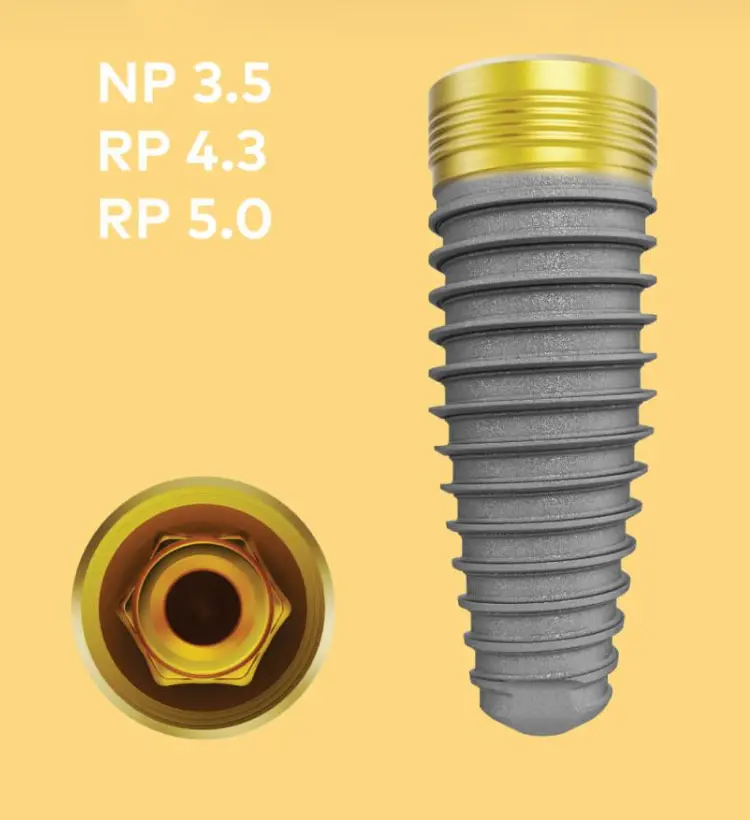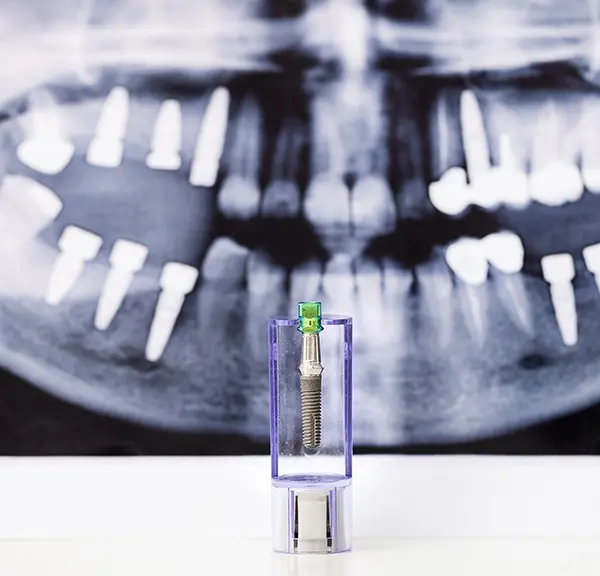IMPLANT DENTISTRY IN OUR CLINIC
GERMAN TECHNOLOGY IN IMPLANT DENTISTRY
German technology in implant dentistry is widely recognized for its precision, reliability, and innovation. With a rich history of engineering excellence and a commitment to producing high-quality dental solutions, Germany has established itself as a global leader in this field.
One key aspect that sets German technology apart is its focus on research and development. German companies invest heavily in advancing implant dentistry through extensive scientific studies and collaborations with leading universities and research institutions. This dedication to continuous improvement ensures that German dental implants incorporate the latest technological advancements and meet the highest standards of quality and safety.
German implant systems are renowned for their exceptional precision and biomechanical compatibility. Implants are meticulously designed using computer-aided design and manufacturing (CAD/CAM) technology, allowing for optimal fit and function. German manufacturers utilize state-of-the-art manufacturing techniques, such as laser welding and surface treatment processes, to enhance the longevity and stability of the implants.
Furthermore, German implant dentistry places a strong emphasis on aesthetics. German-made prosthetic components, such as abutments and crowns, are crafted with meticulous attention to detail, ensuring a natural and harmonious look that seamlessly blends with the patient’s existing dentition. The use of high-quality materials, such as zirconia and porcelain, guarantees exceptional esthetics and long-term durability.
Another notable feature of German technology in implant dentistry is its comprehensive product range. German manufacturers offer a wide selection of implant designs, sizes, and prosthetic options to cater to the diverse needs of patients and dental professionals. This versatility allows for individualized treatment plans and ensures that each patient receives the most suitable implant solution for their specific case.
German dental implants are subjected to rigorous quality control processes throughout the production cycle. Manufacturers adhere to strict regulations and standards, including the European Medical Device Directive, to ensure the safety and reliability of their products. This commitment to quality assurance provides patients and dentists with peace of mind, knowing that they are using implant systems that have undergone thorough testing and meet the highest quality standards.
In summary, German technology in implant dentistry stands at the forefront of innovation, precision, and reliability. Through continuous research, meticulous design, and adherence to strict quality standards, German manufacturers have earned a stellar reputation in the field. Dental professionals and patients alike can trust in the excellence of German dental implants, which offer optimal aesthetics, long-term stability, and superior functionality.

SWISS DENTAL IMPLANT SYSTEMS
Swiss implant technology in dentistry is renowned worldwide for its exceptional quality, precision engineering, and innovation. Switzerland, a country renowned for its precision manufacturing and engineering expertise, has established itself as a leading player in the field of dental implantology.
Swiss implant technology is characterized by its meticulous attention to detail and focus on excellence. Swiss manufacturers employ state-of-the-art research and development facilities, collaborating with leading dental professionals and academic institutions to push the boundaries of implant dentistry. This dedication to continuous improvement ensures that Swiss dental implants are at the forefront of technological advancements.
One of the key strengths of Swiss implant technology lies in its precision engineering. Swiss manufacturers employ advanced manufacturing processes, such as computer-aided design and manufacturing (CAD/CAM), to create implants with exceptional accuracy and fit. This precision is crucial for ensuring a secure and stable implant placement, resulting in successful long-term outcomes for patients.
Swiss dental implant systems are also known for their high-quality materials and superior biocompatibility. Swiss manufacturers utilize top-grade titanium alloys and biocompatible surface coatings to enhance osseointegration—the process by which the implant fuses with the jawbone. These materials and surface treatments promote optimal healing, minimizing the risk of complications and ensuring the long-term success of the implant.
In addition to their technical excellence, Swiss dental implants are recognized for their versatility and customization. Swiss manufacturers offer a wide range of implant designs and prosthetic components, allowing dental professionals to tailor treatment plans to the specific needs of each patient. This flexibility ensures that patients receive individualized care and optimal esthetic outcomes.
Swiss implant technology also places a strong emphasis on research and clinical evidence. Swiss manufacturers invest significantly in scientific research and clinical studies to validate the performance and effectiveness of their implants. By staying at the forefront of scientific knowledge, Swiss implant manufacturers continuously improve their products and contribute to the advancement of implant dentistry as a whole.
Quality control is another hallmark of Swiss implant technology. Swiss manufacturers adhere to stringent quality standards, such as ISO 13485 and the European Medical Device Directive, to ensure the safety and reliability of their products. This commitment to quality is reflected in the rigorous testing procedures and comprehensive quality control measures that Swiss implants undergo before reaching the market.
In conclusion, Swiss implant technology in dentistry stands as a testament to precision, quality, and innovation. Through their meticulous engineering, dedication to research and development, and adherence to strict quality standards, Swiss manufacturers have earned a reputation for producing exceptional dental implants. Dental professionals and patients can rely on Swiss implant technology for its superior functionality, long-term success rates, and commitment to advancing the field of implant dentistry.

COMPARISON BETWEEN SWISS, GERMAN AND KOREAN DENTAL IMPLANT TECHNOLOGIES
German, Swiss, and Korean dental implant technologies are all recognized for their excellence and contributions to the field of implant dentistry. Each of these countries has unique strengths and innovations that set them apart.
German implant technology is renowned for its precision engineering and commitment to quality. German manufacturers invest heavily in research and development, resulting in implants that incorporate the latest technological advancements. The focus on aesthetics, biomechanical compatibility, and a comprehensive product range make German implants a popular choice for dental professionals worldwide.
Swiss implant technology is synonymous with precision and craftsmanship. Swiss manufacturers combine meticulous attention to detail with advanced manufacturing processes, resulting in implants that offer exceptional fit and accuracy. The use of high-quality materials, biocompatible coatings, and customization options contribute to successful outcomes and patient satisfaction.
Korean implant technology has gained significant recognition in recent years for its innovative approaches. Korean manufacturers have been at the forefront of digital dentistry, utilizing advanced technologies like 3D printing, intraoral scanners, and computer-guided implant surgery. These advancements enable precise planning, efficient procedures, and excellent clinical outcomes.
When it comes to quality control, German and Swiss manufacturers adhere to strict regulations and standards, such as the European Medical Device Directive. Korean manufacturers also prioritize quality and undergo rigorous testing procedures. Each country’s commitment to quality assurance ensures the safety and reliability of their implant systems.
In terms of cost, German and Swiss implant technologies are often considered premium options with higher price points. These implants justify their costs with exceptional durability and long-term success rates. Korean implant technologies, on the other hand, are known for their competitive pricing, making them an attractive choice for patients seeking quality at a more affordable price.
Ultimately, the choice between German, Swiss, and Korean implant technologies depends on individual preferences, specific patient needs, and budget considerations. Dental professionals may favor German or Swiss implants for their precision and extensive research backing. Meanwhile, those looking for cutting-edge digital solutions may opt for Korean implant technologies.
In summary, German, Swiss, and Korean implant technologies each bring distinct advantages to the field of implant dentistry. German implants excel in precision and comprehensive product ranges, Swiss implants are renowned for craftsmanship and customization, while Korean implants showcase innovation through digital dentistry. Dental professionals can confidently select from these options based on their unique requirements and patient preferences.
ALL ON 4 AND ALL ON 6 DENTAL IMPLANT SYSTEMS
All-on-4 and All-on-6 Dental Implant Systems for Edentulous Jaws
When it comes to restoring a smile and regaining the functionality of a full set of teeth, dental implant systems have revolutionized the field of dentistry. Among the popular options for edentulous jaws are the All-on-4 and All-on-6 dental implant systems. These innovative solutions provide patients with a stable and permanent set of teeth, enhancing their quality of life and confidence. In this article, we will explore the All-on-4 and All-on-6 systems, their benefits, and how they can transform the lives of those with missing teeth.
The All-on-4 and All-on-6 dental implant systems are both designed to address the needs of individuals who have lost all or most of their natural teeth. These systems offer a fixed implant-supported prosthesis that closely resembles a full arch of teeth. The key difference between the two lies in the number of implants used to support the prosthesis.
Starting with the All-on-4 system, it utilizes four dental implants strategically placed in the jawbone. The implants are angled and positioned to take maximum advantage of the available bone volume, reducing the need for bone grafting procedures. By optimizing the placement of the implants, the All-on-4 system offers a stable foundation for the prosthetic arch, allowing for immediate function and aesthetic restoration.
On the other hand, the All-on-6 system employs six dental implants, providing additional support and stability for the prosthetic arch. This system is recommended for individuals who may have a higher bite force or bone quality concerns that require a greater number of implants for optimal support. The extra implants distribute the forces more evenly across the jaw, reducing the strain on individual implants and potentially increasing long-term durability.
Both the All-on-4 and All-on-6 systems offer significant advantages over traditional removable dentures. Firstly, they eliminate the need for adhesives or denture creams, providing a fixed solution that feels and functions like natural teeth. Patients can enjoy a full range of foods without worrying about their dentures slipping or causing discomfort. Additionally, these implant systems help preserve the jawbone by stimulating its growth, preventing bone loss and maintaining facial structure.
Another benefit of the All-on-4 and All-on-6 systems is the reduced treatment time compared to individual dental implants. Since the implants are strategically positioned and angled, the need for bone grafting procedures is often minimized or eliminated altogether. This significantly reduces the overall treatment duration, allowing patients to enjoy their restored smiles and improved oral function sooner.
Before undergoing any dental implant procedure, thorough examination and planning are crucial. A comprehensive evaluation of the patient’s oral health, bone structure, and overall medical history should be conducted. This assessment helps the dental team determine which system is most suitable for the individual’s specific needs and ensures a successful outcome.
In conclusion, the All-on-4 and All-on-6 dental implant systems are remarkable solutions for individuals with edentulous jaws. They provide stable, functional, and aesthetically pleasing results, restoring patients’ confidence and quality of life. Whether it is the All-on-4 system’s optimized use of four implants or the All-on-6 system’s enhanced support with six implants, both options offer significant advantages over traditional dentures. If you are considering dental implants for your edentulous jaw, consult with a qualified dental professional to determine the most appropriate treatment plan for you.



